If you love science and want to be a senior environmental researcher, teach environmental studies at a university, or pursue environmental public policy research, you may be interested in getting a PhD in Environmental Science.
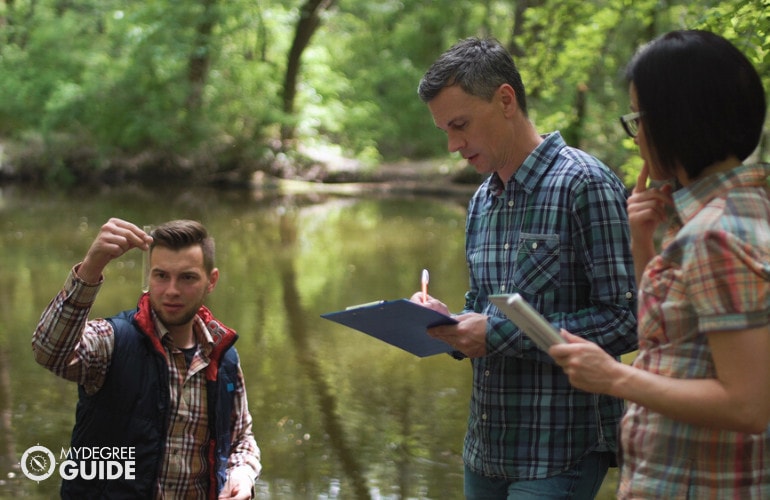
A doctorate can also help you qualify for a job at the EPA, National Park Service, or US Geological Survey.
Editorial Listing ShortCode:
Many PhD graduates work in a lab or office, but some environmental scientists might also spend lots of time in nature. They can conduct fieldwork, take measurements or samples, or help with engineering planning and oversight.
Online PhD in Environmental Science Programs
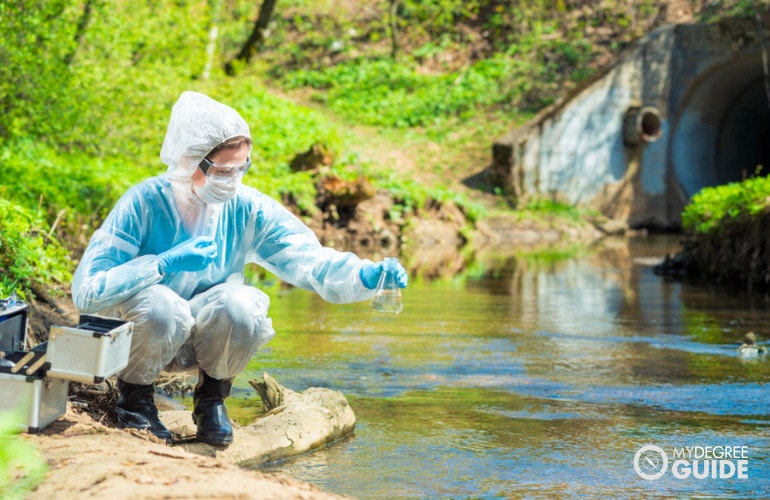
You may find that online PhD programs in environmental science continue where online masters in environmental science programs leave off in offering you advanced study in core topics as well as opportunities to pursue a concentration aligned with your graduate school interests and goals. The field can open doors to various roles, depending on your interests and aptitudes.
Quantitative data management and analysis, resource conservation, environmental engineering, public policy research, agricultural research, alternative energy research, teaching, and consulting are just some of the areas you can choose to do your dissertation research.
Editorial Listing ShortCode:
A doctoral program will typically include both technical learning and opportunities to conduct real-life fieldwork and complete authentic dissertation research projects and papers. Common careers in this field and related fields include environmental scientist, natural sciences manager, conservation scientist, and hydrologist.
Environmental Science Careers & Salaries
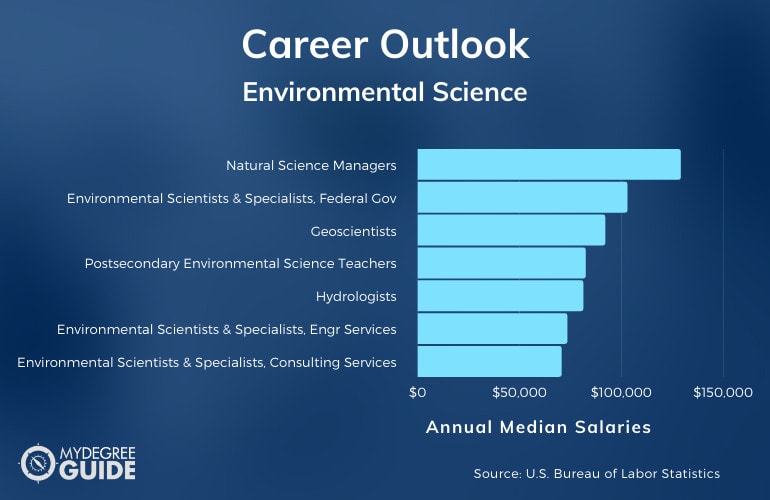
Not everyone who pursues a Ph.D. in Environmental Sciences will fit the same mold. Checking out different online environmental sciences and environmental studies graduate programs can help you see just how diverse the career paths can be.
Environmental scientists might work alongside civil engineers to provide geoscience or materials analysis expertise. They can also help develop and complete technical environmental impact reports.
According to the Bureau of Labor Statistics, a doctorate can help connect you to a range of well-paid and meaningful career paths.
| Careers | Annual Median Salaries |
| Natural Sciences Managers | $129,100 |
| Environmental Scientists and Specialists, Federal Government | $102,910 |
| Geoscientists | $92,040 |
| Postsecondary Environmental Science Teachers | $82,430 |
| Hydrologists | $81,270 |
| Environmental Scientists and Specialists, Engineering Services | $73,410 |
| Environmental Scientists and Specialists, Consulting Services | $70,590 |
| Environmental Scientists and Specialists, Local Government | $68,190 |
| Environmental Scientists and Specialists, State Government | $65,180 |
| Conservation Scientists and Foresters | $62,410 |
Environmental scientists, researchers, and policy experts also have roles to play in resource management, conservation biology, and in climate science and climate monitoring. They can also work to protect and manage forests or other open spaces.
With a PhD you might want to pursue a university teaching position. You may also be interested in working with a professional consulting firm, consulting on engineering design challenges, or leading public interest advocacy initiatives.
Some professionals in the field work at federal agencies, such as the EPA, the US Geological Survey, the National Park Service, and the Department of Forestry.
Environmental Science Doctoral Curriculum
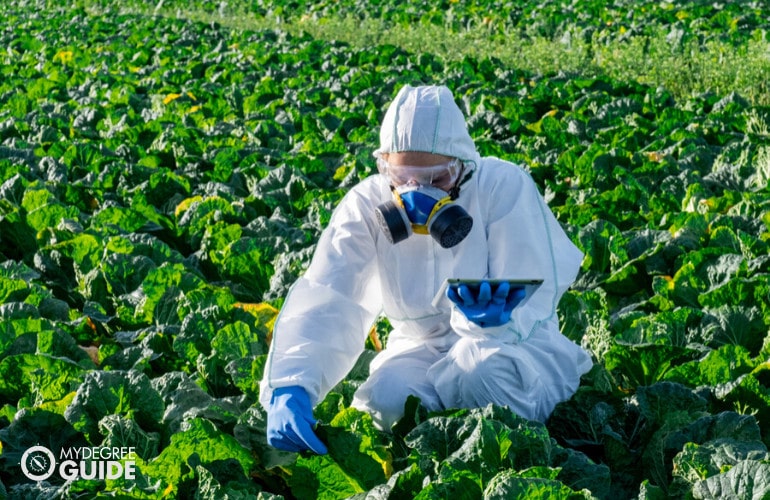
Many environmental science doctoral programs cover core topics—such as research methodology and design courses—and designate course clusters aligned to specific career-related graduate school concentrations.
- Environmental Science Management: You’ll learn about core methods and current perspectives in the field of applied environmental science, including land-use, resource protection, and resource management.
- Environmental Science Policy: This course is an overview of public policy development practices and challenges in areas such as ecology, climate change, pollution, soil conservation, and watershed protection.
- Environmental Engineering: This is a comprehensive course on different topics in environmental science, such as soil science and hydrology, as they relate to engineering planning, design, and regulatory compliance.
- Biosystems Modeling: You’ll learn about the methods and tools environmental scientists use to evaluate biosystems and model trends or impacts involving diverse and complex variables.
- Climate Modeling: This course looks at current climate trends, including risk forecasting and data systems, data interpretation methods, and methods for modeling a variety of climate variables and effects.
- Pollution Assessment: You’ll learn how to identify, measure, report, and track various forms of pollutants with diverse sources, and you’ll assess and model contaminants and their potential environmental impacts.
- Environmental Soil Chemistry: This course provides advanced understanding of soil conditions and dynamics with a focus on analyzing soil profiles and various research applications.
- Forest Hydrology: This course helps you understand water cycles and flood and drought dynamics, assess toxicity levels in water sources, and manage freshwater ecosystems.
- Data and Policy: This course is an in-depth study of environmental science data collection and data interpretation methods and controls in the context of policy formation and public policy reporting.
- Field Methods in Ecology: You’ll learn practical methods and participate in hands-on eco-system research, including the study of reliable methods for sampling, analysis, data collection, and data reporting.
Courses in an environmental sciences program will vary by school and program. Most doctoral programs in environmental science, though, require dissertation research or other substantive capstone components.
Admissions Requirements

Admissions requirements for an environmental science doctoral program vary by school and program. Some programs may accept students who have completed a bachelors degree while others will require you to have a masters. The following are common admissions criteria:
- Bachelors or masters in environmental science or related field
- Satisfactory GPA (usually 3.0 or 3.5)
- Letters of recommendation
- Relevant professional experience (if required)
- GRE or GMAT scores (if required)
When applying to an environmental science doctoral program, it can be helpful to provide evidence of the kind of future work or research you aspire to as well as how it relates to your doctoral studies and research interests.
Accreditation

When exploring environmental science PhD programs, it’s beneficial to make sure the school and program are fully accredited.
Regional accreditation testifies that a school meets acceptable standards for academic quality. The coursework in an accredited graduate school program teaches knowledge and skills that are on par with professional standards in your field.
Editorial Listing ShortCode:
Regional accreditation can also be a requirement for receiving some forms of financial aid. It can also help ensure that your degree will be honored by other schools and prospective employers. The Council for Higher Education Accreditation (CHEA) provides more information on accreditation.
Financial Aid and Scholarships

Getting a PhD in Environmental Sciences will typically require several semesters of advanced coursework, such as in basic and applied sciences. So, even if you work part-time as you learn, you may be one of many students who needs financial assistance in order to stay enrolled and stay focused on learning.
You might qualify for state or federal financial aid, need-based or merit-based scholarships, work study programs, or even employer-based tuition assistance. You can also apply for student loans to help you cover any financial gaps. Loan terms can vary, so it’s strategic to look over any student aid package or loan offering carefully.
If you’re anticipating applying for need-based assistance, you can start by filling out the Free Application for Federal Student Aid (FAFSA).
What Are the 5 Major Fields of Environmental Science?

Environmental scientists work in a variety of fields and roles. Simply checking out the different course concentrations offered by online environmental science degree programs can help you identify the most popular fields today.
The 5 major fields of environmental science are:
- Social sciences
- Geosciences
- Environmental chemistry
- Ecology
- Atmospheric sciences
Your past work experiences and your future goals and aspirations can help you pick the best PhD program option with the right course concentrations.
Is Environmental Science a Useless Degree?

A doctoral degree in environmental science can help you develop your expertise in this interesting field. Environmental scientists can help private firms or government agencies with environmental impact studies or with civil engineering or conservation projects.
Professionals in the field can also use their expertise to work for federal agencies, such as the EPA, the US Geological Survey, or the US Forest Service. The need to respond to threats such as pollution, dwindling natural resources, or global warming could also drive new job growth in this field.
The Bureau of Labor Statistics forecasts that jobs for both natural sciences managers and geoscientists will have 5% growth. Environmental scientists are projected to have 8% job growth.
What Can You Do with a PhD in Environmental Science?
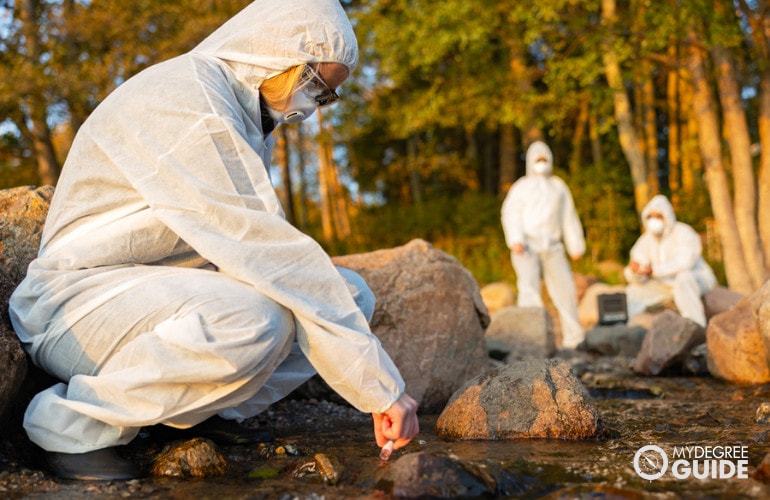
There are many options you can pursue with a doctorate in environmental science, depending on your goals and individual interests.
Some graduates are interested in doing lots of outdoor fieldwork related to ecology, climate, or agriculture. This could also include laboratory science, with data-crunching, data analysis, and data modeling in the basic and applied sciences.
Some environmental scientists devote themselves to initiatives focused on environmental sustainability. This can include protecting natural resources, improving open spaces, or combatting pollution or climate change.
Editorial Listing ShortCode:
If you’re interested in leadership or advocacy work, you might be interested in working as a researcher or public policy expert. A PhD can also help qualify you to teach university courses on environmental studies, environmental science, and environmental policy.
In private industry or private consulting roles, environmental scientists may work alongside civil engineers and civil engineering architects. They may also work on developing environmental impact statements.
Is a PhD in Environmental Science Worth It?

Yes, a PhD in Environmental Science is worth it for many students. Some graduates go on to work for a cause they’re passionate about. This can include protecting open spaces or ecosystems, leading public interest research, or using science to combat pollution or climate change.
In fact, jobs for geoscientists and conservation scientists are anticipated to grow 5% over the next ten years (Bureau of Labor Scientists). Meanwhile, environmental scientists and specialists are expected to experience 8% job growth, faster than the average for all occupations.
Getting a doctoral degree in environmental science can also be worthwhile if you’re interested in doing original research or field work. For example, there are doctoral programs that emphasize fieldwork, research design and methodology, quantitative analysis, and database management .
Earning a terminal degree like a PhD can also open up opportunities for well-paying consulting jobs, roles with the federal government, or teaching positions at a college or university.
Universities Offering Online PhD in Environmental Science Degree Programs
Methodology: The following school list is in alphabetical order. To be included, a college or university must be regionally accredited and offer degree programs online or in a hybrid format.

Antioch University offers an online PhD in Environmental Studies program. To apply, applicants must submit 3 letters of recommendation.
The program can typically be completed in 4 years and requires 69 credits to graduate. During the first two years of the program, students must attend an 8 day summer program. They must also attend in-person classes over 4 weekends during certain semesters.
Antioch University is accredited by the Higher Learning Commission.

Mississippi State University offers an online PhD in Civil and Environmental Engineering program. Applicants must have a GPA of 3.0 to be eligible.
Students may choose to specialize in one of seven different areas, including Environmental Engineering. The program requires students to complete 18 hours of coursework and 20 hours of research for a thesis.
Mississippi State University is accredited by the Southern Association of Colleges and Schools Commission on Colleges.

The University of Missouri offers an online program for a PhD in Human Environmental Science with an emphasis in Architectural Studies.
To graduate, students must complete 72 credits. The program usually takes 5 years to complete. To be eligible for the program, applicants are required to have a GPA of 3.0 or higher, official transcripts, and 3 letters of recommendation.
The University of Missouri is accredited by the Higher Learning Commission.

The University of North Dakota offers a PhD in Environmental Engineering. The program requires 90 credit hours and usually takes 7 years to complete.
Students may choose between online or in-person learning. Applicants must have a minimum GPA of 3.0 and must submit an online application with all official transcripts and references.
The University of North Dakota is accredited by the Higher Learning Commission of the North Central Association of Colleges and Schools.

Villanova University offers an online PhD in Civil and Environmental Engineering program. To graduate, students must reach the minimum credit requirements, pass a qualifying exam and a comprehensive exam, and defend a PhD dissertation.
Applicants must submit all transcripts, 2 applicant rating forms, a statement of purpose, a resume, and official GRE scores.
Villanova University is accredited by The Middle States Commission on Higher Education.
Getting Your PhD in Environmental Science Online

If you have a passion for environmental science, then you may be interested in further developing your expertise through an online environmental sciences doctorate program. Regardless of the level, though, whether it’s an associates degree in environmental science online or a PhD, you may also get to build strong professional networks along the way.
Online environmental science graduate school programs offer a variety of study options and course concentrations, so you can find the right match for your preferred experiences and career pathways.
You can start this next step in your educational journey today by exploring online PhD environmental sciences program offerings from accredited universities.

